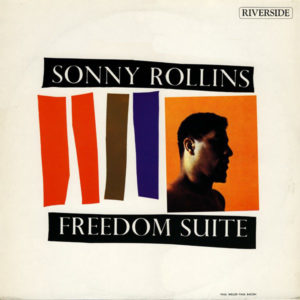The following is from Julia Paul’s class presentation:
Sonny Rollins:
- Theodore Walter Rollins
- Born September 7, 1930 in NYC
- Started on alto sax at 7 or 8 then switched to tenor sax at 16
- Grew up with an activist grandmother who took him to marches
- In his early career, he made records that dealt with civil rights and black pride
Freedom Suite (1958)
- the Freedom Suite, Someday I’ll Find You, Will You Still Be Mine?, Till There Was You, Till There Was You (alternate version), Shadow Waltz
- Tracks 2-6 recorded February 11, 1958 & track 1 recorded March 7, 1958
- Recorded in New York
- Sonny Rollins on the tenor sax, Oscar Pettiford on the bass, and Max Roach on the drums
- Beginning of Civil Rights Movement- controversial album
- “America is deeply rooted in Negro culture: its colloquialisms; its humor; its music. How ironic that the Negro, who more than any other people can claim America’s culture as his own, is being persecuted and repressed; that the Negro, who has exemplified the humanities in his very existence, is being rewarded with inhumanity.”
- About presence and absence of freedom as a creative artist and African American
- One of first extended compositions for tenor sax
- 19 minutes long (half of album)
- Interconnected themes, variations in melody, and improvisation
- “Play the melody, not the changes” -Thelonious Monk
- Analysis:
- Length of piece represents the long length of time in history that African Americans have suffered in the US
- Composition & improvisation represents the freedom Rollins wants to live in
- Joy, anger, and struggle all heard in song to represent many aspects of fight for equality
- Constant melody with improvisation represents constant strength of African Americans despite hardship and constant change
(0:00-1:30, 10:00-10:45)

